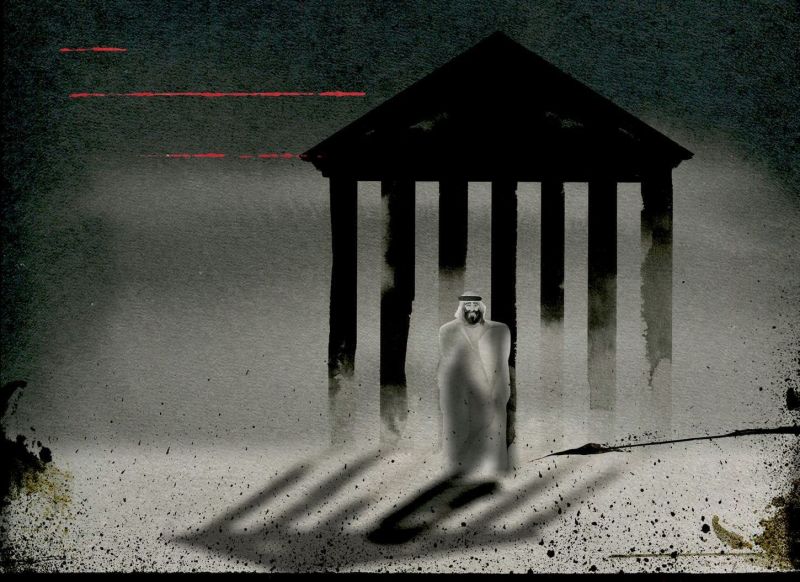
When Jamal Khashoggi and I worked together, I remember asking him about the infamous purge orchestrated by Mohammed bin Salman in 2017, when he detained scores of princes, other members of the royal family and wealthy Saudi businessmen at the Riyadh Ritz-Carlton. At the time, the crown prince framed the arrests as a crackdown on high-level corruption.
Jamal said he supported reigning in the corruption that had been a massive drain on Saudi economic development. “Still, shouldn’t there be trials?” I asked. I argued that was the best way to get the rest of the world to have confidence in doing business in Saudi Arabia. In January 2018, Jamal wrote that “tackling corruption … could be prosecuted with transparency and fair application of the law".
Months later, Jamal would be killed by Saudi agents in the kingdom’s consulate in Istanbul. It’s no secret that there has been no transparency or fair application of the law for that crime. The CIA concluded with high confidence that Mohammed bin Salman, or MBS, ordered the murder, but for two years, Saudi Arabia’s courts have made a mockery of justice while claiming to prosecute those responsible, in a process that has been marked by a total lack of transparency. Jamal’s murder has also been a test case for the rule of law in America’s democracy — and so far we have failed that test. President Trump has even bragged about helping MBS escape accountability for the murder.
But this betrayal of basic human rights values and legal norms has not stopped tireless individuals and organizations from using different means to apply pressure on the Saudi regime and those who aid and abet it.
Last year, the Open Society Justice Initiative filed a federal lawsuit against the U.S. government to compel various federal agencies to declassify and release records relating to Jamal’s case in a timely manner. In August of last year, U.S. District Judge Paul A. Engelmayer ruled that Jamal’s case was of “considerable public importance” and that the federal government should quickly process all records related to it.
The administration has barely moved an inch in this direction. Although the State Department has released some documents, most of them are heavily redacted. Attorney Amrit Singh with the Open Society Justice Initiative told me: “We have not received a single meaningful record that would shed light on who is responsible for the murder”.
That the Trump administration is flouting legal requests is not new. Last year, Congress officially requested that the White House submit a report on whether it believed that Mohammed bin Salman was personally responsible for Jamal’s murder. Under the Magnitsky Act, the Trump administration was legally required to respond in 120 days — instead, it chose to ignore the request and never filed a report. There have been no consequences for the administration for this breach, strengthening critics of the Magnitsky Act who argue it has no teeth.
Saudi citizens living in exile have also turned to the law to fight back against MBS. Saad Aljabri, a former top Saudi intelligence officer, close U.S. intelligence ally and aide to Mohammed bin Salman’s former rival to the Saudi throne, recently filed a federal lawsuit in Washington against the crown prince, accusing him of orchestrating a hit squad to track and kill him. Like Jamal, Aljabri fled Saudi Arabia for his safety and is currently under tight security protection in Canada.
Other Saudis are suing organizations that they believe helped Saudi Arabia in targeting dissidents. Omar Abdulaziz, who was in contact with Jamal to create a project to counter Saudi Arabia’s army of online trolls and bots, sued the Israeli spyware firm NSO Group, whose Pegasus technology was allegedly used to spy on both him and Jamal. Abdulaziz claims the Pegasus spyware on his phone was used to spy on messages between him and Jamal months before Jamal’s murder.
This year, Ali Al-Ahmed, a Saudi activist and analyst living in Washington, also filed a lawsuit in New York against Twitter after two former employees of the social media company were charged with spying for Saudi Arabia by snooping into thousands of private accounts seeking personal information about critics of the regime. According to the lawsuit, the kingdom used that information to help shut down scores of critical accounts; Al-Ahmed claims the spying helped Saudi authorities target and torture Saudi critics in the country.
The information discovered during legal proceedings is crucial, and not only for understanding the regime’s tactics. Rulings against the regime could set legal precedents that could help protect the rights and lives of activists and free thinkers all over the world in the future.
Thanks to determined Saudis and human rights organizations, the Saudi regime’s murderous ways are still on trial. History will judge the Trump administration harshly for helping Saudi Arabia get away with Jamal’s killing, but a Biden administration could still hold MBS accountable.
America’s commitment to international justice and the rule of law remains on trial, too.
Karen Attiah, Global Opinions editor, writing on international affairs and social issues.
